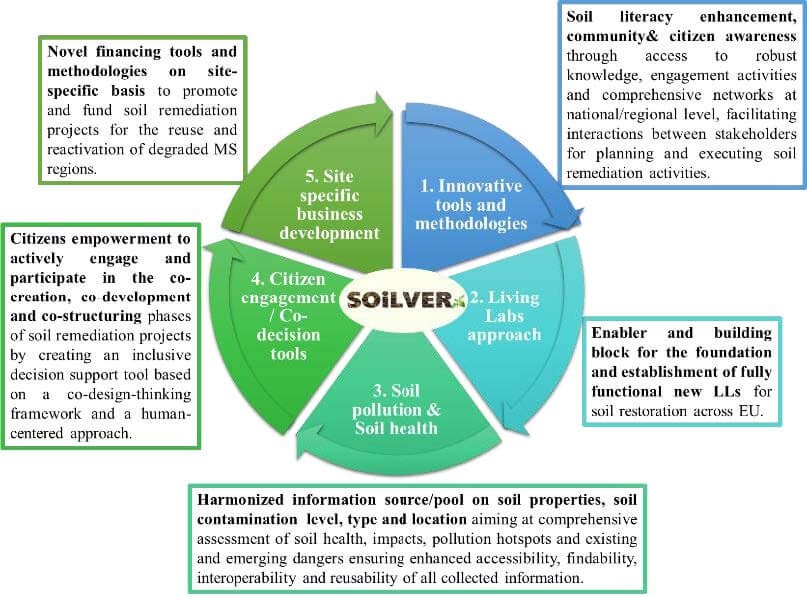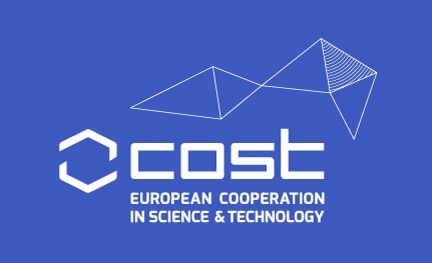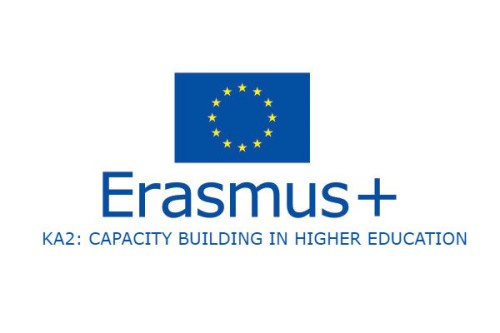
SOiLVER platform -Innovative planning, management and financing of decontamination and reuse of land
Call ID: HORIZON-MISS-2022-SOIL-01-04
Remediation strategies, methods and financial models for decontamination and reuse of land in urban and rural areas
The project was submitted in September 2022. The result is expected in the beginning of 2023.
Soil contamination is recognized as a major global concern causing potential adverse effects on human health and the environment. Although, soil scientists are unequivocal towards the impacts of soil pollution, societal appreciation regarding soil contamination hazards is yet to be established. The transition to zero pollution and resilient societies adapting to the requirements for soil pollution reduction and restoration, entails major transformation to citizen engagement and empowerment. Indeed, the European Commission (EC) has identified 1.2 million contaminated sites, with less than 5% being currently remediated. Additionally, a large proportion of EU soils is currently subject to unsustainable management practices, jeopardizing soil health and people’s livelihood. Hence, there is a particularly strong political imperative to undertake remediation actions. However, remediation strategies vary as they depend on the site’s specific characteristics, such as the size of the affected area, contaminants’ type and concentration, protective measures to be taken for the population during remediation, most importantly, the target level of decontamination to be achieved, as in many cases achieving 100% removal is neither feasible technically nor economically despite social pressures. The existing environment and proposed end-use of the area upon remediation is also a critical consideration as this determines the sensitivity of the receptor.
Investment costs may include acquisition of private property, scientific research and environmental monitoring, removal of pollutants, translocation of species, and compensation to local resource users for any reduction in their existing economic rights. Establishing an acceptable balance or rebalancing regulations, interests, risks and vulnerabilities is a key challenge, especially as the respective remediation costs may range from a few thousands to hundreds of millions of euros annually and the ownership of the problem (contaminated soil) and beneficiaries of decontaminated land do not always coincide. At the same time, the re-use of the restored land and potential respective business models may also become an object of conflict between interest groups seeking a balance between revenues that may be generated against business investment cost and welfare gains. Combined with the large investments needs, co-creating and co-deciding the way forward amongst actors and stakeholders related to the respective sites, becomes imperative as is the need to co-understand, co-design, co-fund/finance and, ultimately, co-realize business models capable to regenerate soil, land and sites livelihood. This is especially important in regions affected by the green transition. Additionally, the decontamination and reclamation of contaminated lands across Europe regains all its importance and relevance in view of the food crisis caused by the war in Ukraine.
Interestingly, important financial instruments for the delivery of public good assets, investments and benefits have been widely applied and promoted during the last three decades with the involvement of the private sector, such as Public-Private Partnerships or crowdfunding depending on the business models applied. These models supported government budgets and brought forward public investments which otherwise would only be possible in the long-term future. However, such models, justified as support to the public sector, have limited applicability when addressing the need to restore land contaminated by industrial activity, often caused by over-exploitation of natural resource and poorly applied “polluter pays” principle. To this end new Funding and Financial models need to be proposed and tested which endorse the differing aspirations of stakeholders especially with respect to short-, medium- and long-term and inter-generational returns and opportunities. SOiLVER has identified the pressing need of addressing soil remediation in a holistic way through the co-creation of accepted solutions and strategies for decontamination, the co-development of business models for land re-use supported by co-structuring of site-specific financing models through the LLs approach. SOiLVER ambitions to establish a holistic approach supported by a novel technological platform, which will function as a robust decision facilitating tool for soil remediation and reactivation of degraded sites in urban, peri-urban and rural areas. SOiLVER will facilitate all relevant stakeholders towards prioritisation of soil pollution and optimum selection of site-specific soil remediation and reactivation approaches. SOiLVER will be validated in 6 pilot sites and the generation of a Soil Hub in each site is foreseen to bring together policy-makers, scientists, urban planners, citizens, local communities, and land owners. The goal is to provide a one-stop shop for all private or public bodies, organizations, cities/municipalities and local inhabitants involved in soil remediation. SOiLVER aspires to become the building block for the implementation of soil remediation projects and act as the main enabler for the initiation of LLs targeting soil restoration across EU, in line with the European Soil Mission objectives.


